#Emperor Franz Josef I
Text
Danube and Wien Rivers Vienna Austria
Danube and Wien Rivers Vienna Austria
The Danube River in Vienna isn’t as dramatic as rivers in other European cities, like the Thames in London, Spree in Berlin, Vltava in Prague, or Seine in Paris. Unlike in Budapest, the Danube doesn’t flow through picturesque parts of the city. Instead, it crosses the upper section of Vienna away from Vienna’s Ringstrasse and the beautiful historical center.
Wien River Bridge in Front of…

View On WordPress
#1949 film The Third Man#Alte Donaul#Danube Floods#Danube Island#Danube River#Danube Tower#Donauinsel#Donaukanal#Emperor Franz Josef I#Lichterfest#Naschmarkt#Night Market#Old Danube#Schönbrunn Palace#The Spittelau Waste Incineration Plant#Vianne Light Festival#Vienna Austria#Vienna Giant Ferris Wheel#Vienna Ringstrasse#Wien River#Wienfluss
1 note
·
View note
Photo

Josef Albert
Emperor Franz Joseph I of Austria-Hungary at age 35
1865
#Josef Albert#photography#old photograph#Franz Joseph I#Austria#Austria-Hungary#history#Royalty#Europe#1865#Habsburg#monarchy#Emperor#Austrian Empire#Austro-Hungarian Empire#monarch#19th century
35 notes
·
View notes
Note
Were they just honoring the exact same family members when they named Reichstadt and FJ or...Sophie gurl please.
JGJGHJSJK you know this idea actually crossed my mind, but basically yes, it just happened that the Habsburg's name pool was as big as their gene pool. But this actually is an interesting question, so let's take a super brief look at Habsburg naming!
As frustrating as it may be for us that everyone on this dynasty had the same three names, there was a logic behind it. Historian Barbara Stollberg-Rilinger in her fantastic biography of Empress Maria Theresia puts it best:
In the House of Habsburg, Christian names were always chosen from the same limited reservoir of saints, in ever varying order. The aim was not to stamp children as one-of-a-kind individuals but to mark dynastic identity and continuity.
While Stollber-Rilinger is specifically talking about the mid 18th century, some decades before the world turned upside down and many things changed forever, this naming convention kept being truth for the Habsburgs until the end of the dynasty. For example Franz Josef's son Rudolf was named after Rudolf I (1218-1291), the first king of the Romans from the House of Habsburg. The intention of marking Rudolf 's "dynastic identity and continuity" was clear. On top of that, it was also very usual to name a child after their godparent(s), who were often family members. It's not surprising, then, that most male members of the House of Habsburg in the 19th century were called a combination of Franz, Ferdinand, Karl, Josef, Ludwig, Otto or Leopold.
With that overview on Habsburg naming done, let's move on to the two cousins in question: Napoleon "Franz", Duke of Reichstadt and Franz Josef I.
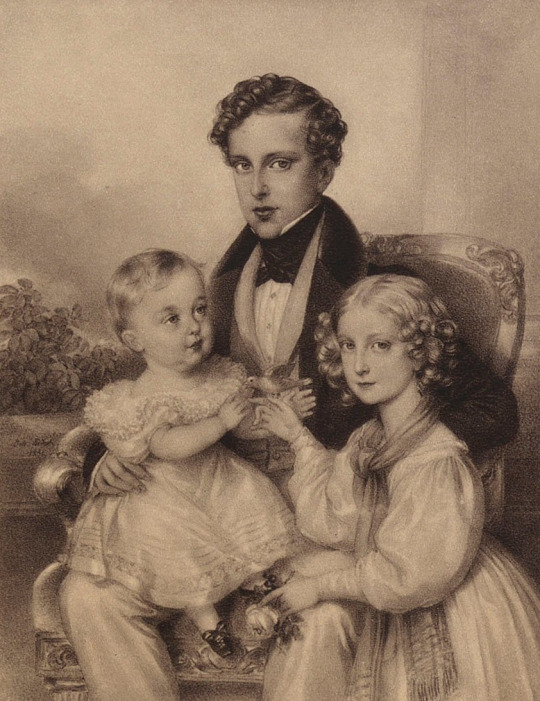
From left to right: Archduke Franz Josef, future Emperor of Austria; Napoleon II, Duke of Reichstadt; Princess Maria Carolina of Bourbon-Two Sicilies, future Duchess of Aumale.
As I said before, I don't know that much about Reichstadt other than the very basics, so I apologize beforehand if there is something wrong here, since I'm not in the loop of which are the best sources about him. In the same way, if there were any particular naming conventions in the House of Bonaparte, I'm not aware of them. That being said, let's look at the King of Rome's names!
Reichstadt's full name was Napoleon François Charles Joseph. Napoleon obviously after his father, a no brainer in my opinion: Little Napoleon's birth was basically a statement that the Bonaparte empire was here to stay. Then we have "François" whose German version would become in the name he would go by during his lifetime. This was after his godfather, his maternal grandfather Emperor Franz. "Charles" was in turn after his paternal grandfather Charles Bonaparte. Finally "Joseph" came from his second godfather, his uncle Joseph Bonaparte, King of Spain.
I find this naming very interesting, because Napoleon was creating a dynastic identity, rather than continuing it. And by throwing Emperor Franz's name in the mix, he joined the identity of his new dynasty with the Habsburgs.
Now let's look at FJ's name!
Sophie and Archduke Franz Karl's firstborn was named Franz Josef Karl. Were did these names came from was surprisingly harder to check than Reichstadt's names, because all the biographies in English that I checked on the Archive just straight up skip his baptism? I had to look for information about it in András Gerő's Hungarian biography of FJ using a machine translator. As I suspected, Emperor Franz was also the godfather of this grandson. In fact, old Franz full name was "Franz Josef Karl" so my guess is that all of FJ's names are after him.
At the time of his birth Franz Josef was several people behind the throne of Austria, yet given that there wasn't much hope in Crown Prince Ferdinand producing an heir, that he might one day succeed was not out of the realm of possibility; perhaps naming him exactly like his imperial grandfather was intentional. In any case, it followed the conventional naming rules of the House of Habsburg. By the way, the future Emperor of Austria was always just called "Franz" or "Franzi" amongst his family, he chose to ascend to the throne by the name of "Franz Josef" because he also wanted to be associated with Emperor Joseph II. Yet another example of Habsburg names marking "dynastic identity and continuity".
Now to finish the ask let's address the elephant in the room, the reason why are we looking at the names of these two cousins in particular instead of literally anyone else. Could Reichstadt had been, in fact, FJ's father?
Rumors about Reichstadt and Sophie being too friendly had in fact been going on even before Franz Josef was born. However, I think pretty much no one believes that him being the future emperor's father is possible. Let's look at what one of Reichstadt's biographers, Octave Aubry, has to say about this:
It has been asserted that Reichstadt was the father of Franz-Josef. The contention does not stand investigation. The friendship between the two lovers did not begin until after the birth of Sophie’s first child. As for her second, Maximilian, who was to be born in July, 1832, and to die in Mexico, such a filiation is not at all impossible. But in that direction everything is conjecture. If the two lovers themselves knew, they kept their secret. They loved each other: that is the only thing certain.
I've only read some fragments of this biography very superficially, but just by this you can tell that Aubry not only believes that an affair indeed happened, but also that he totally ships Reichstadt and Sophie lol. So if even him, who I believe is one of the main biographers to held the belief that they were more than close friends, doesn't buy into the rumors, then truly there isn't any evidence to back this up. About what I think about Max potentially being Reichstadt's son I already answer it in another ask.
Finally, I wanted to note that Reichstadt was very fond of his little cousin Franz Josef. He would often play with with him, and took him in his walks with Sophie. I found in Aubry's biography this very touching moment between them from when Reichstadt was already on the verge of death:
He asked to have little Franz-Josef brought to his room, for the lad’s charming ways delighted him. He stroked his hair repeatedly, and showed him little objects that he thought would amuse him and then finally held him in a tight embrace for a moment, dreaming. The child looked up at him, earnest, bored perhaps. His nurse came for him and his big cousin released him with a sigh.
I like to believe that Reichstadt was happy to share names with the cousin he loved so much.
#tl;dr: they were both named after emperor franz. i just ended up going down a ridiculously deep naming rabbit hole sorry#and now I legit feel like tearing up a bit dfgdfgk#also if you can't tell already my napoleonic subjects of interest are literally just napoleon's sons lol#napoleon ii duke of reichstadt#franz josef i of austria#franz i of austria#asks
33 notes
·
View notes
Text
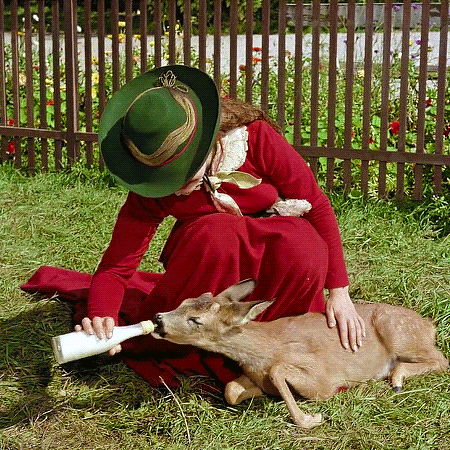

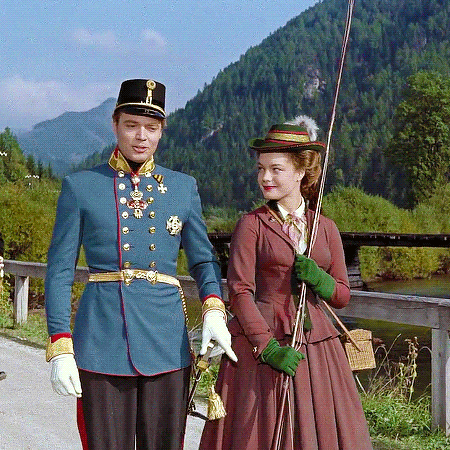
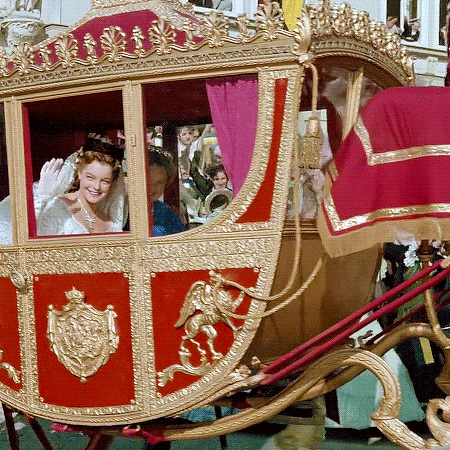

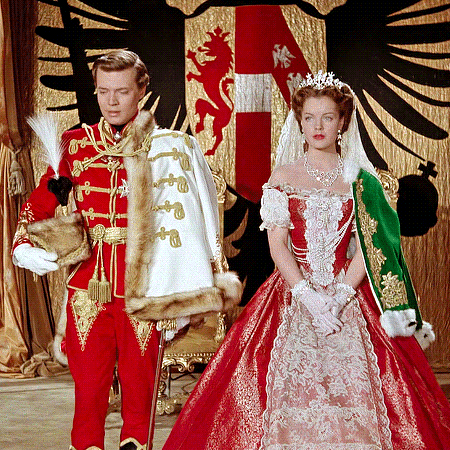


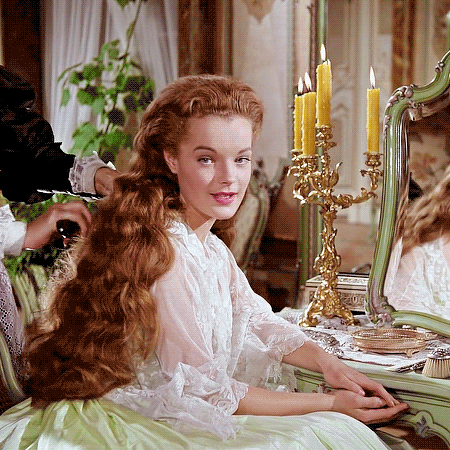
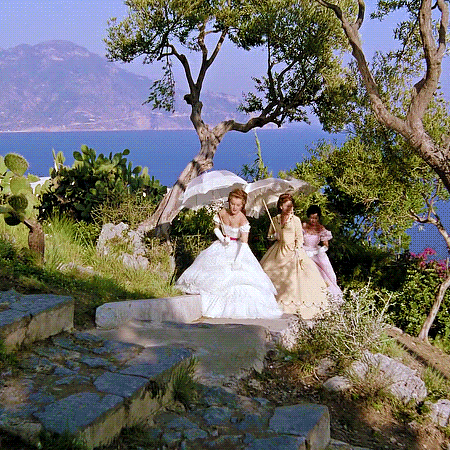
PERIODDRAMA APPRECIATION WEEK 2023
Day 5: Favorite period drama film: Sissi trilogy by Ernst Marischka
The Sissi trilogy is an Austrian film directed by Ernst Marischka and starring Romy Schneider as Sissi, and Karlheinz Böhm, as Franz Joseph I.
In the first of a trilogy of movies about Elisabeth "Sissi" of Austria, the vibrant young princess catches the eye of her sister's fiancé, Emperor Franz Josef.
The second in a trilogy of movies about Elisabeth "Sissi" of Austria, the film chronicles the married life of the young empress as she tries to adjust to formal and strict life in the palace and an overbearing mother-in-law.
The final film in a highly romanticized trilogy about Elisabeth "Sissi" of Austria finds the young empress traveling throughout Europe. (source: imdb)
#sissi (1955)#sissi die junge kaiserin (1956)#sissi schicksalsjahre einer kaiserin (1957)#stuff:mine#perioddramaweek2023
278 notes
·
View notes
Text
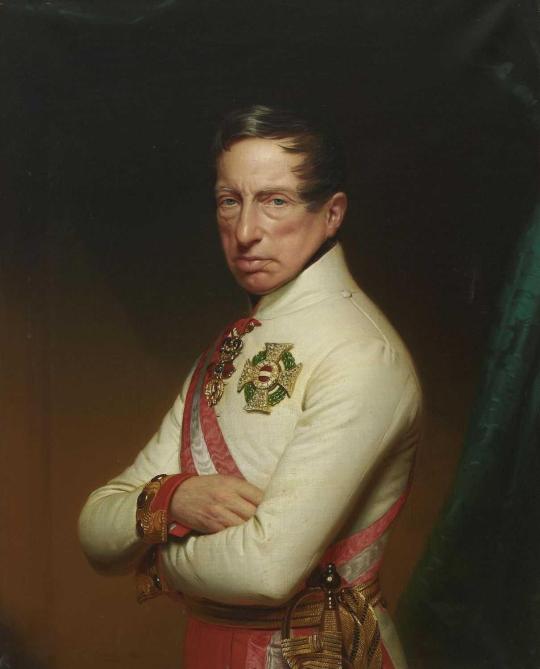


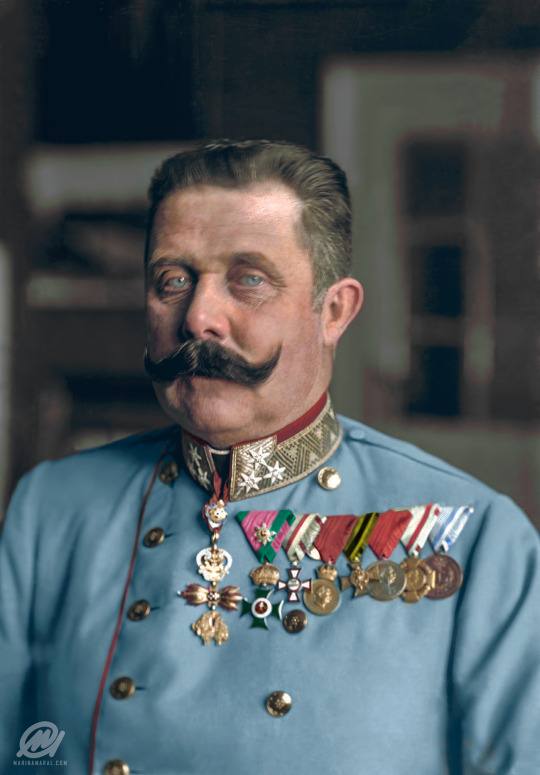
Archduke Karl, Herzog von Teschen (1771-1847): General during both the French Revolution and the Napoleonic Wars. If you have been to Vienna, you have likely seen his statue opposite Prince Eugene of Savoy on the Heldenplatz.
Archduke Johann, Reichsverweser of the German Empire (1782-1859): The reportedly liberal archduke who is most well-known for presiding over the Frankfurt Parliament in 1848 and his role as regent for the German Empire in 1848. There is a statue honoring him in Graz.
Archduke Josef, Palatine of Hungary (1776-1847): Elected Palatine of Hungary who represented Hungarian interests - often in conflict with Franz I/II (who is everyone's favorite here). Provided significant support for the establishment of the Hungarian National Museum and the National Library. There is a statue of him in Budapest that was unveiled after the 1867 Compromise.
Archduke Franz Ferdinand (1863-1914): It would be fair to say that the most famous thing he did was die, but given the consequences of his death, it would be harder for anything to be more significant. He also got married against the usual dynastic protocols and was relatively pro-Slavic.
#best habsburg bracket#admin 1's 19th century bias is probably showing#if you would like to do a similar poll for an earlier period you can give me ideas#everyone thank leopold II for having interesting children despite not being that interesting himself
15 notes
·
View notes
Text
Please reblog for a bigger sample size!
If you have any fun fact about Austria-Hungary, please tell us and I'll reblog it!
Be respectful in your comments. You can criticize a government without offending its people.
8 notes
·
View notes
Text
I need to be asleep but quick rant. Man, every time I think abt how my Austrian civ class ended up being, it pisses me off sm. My prof would constantly be like "omg Habsburgs!!!" when we were in Europe. But then in the class, it's literally only like, mid 19th century-early 20th century stuff, yknow like Sisi and Franz Josef. Which I just. Don't care about. At all. Like you have a niche class, on this country with such a vast and interesting history. And then you focus on the part where, imo, it's arguably the most boring.
I just remember asking him who his fav Habsburg was, and he said Joseph II and when I said Charles VI, he's like "wow that's old." 😭😭 like damn man, that's only two generations back(also real ones will know that techinally everyone past Maria Theresa isnt actually considered a "full" Habsburg.) It just annoys me bcs I was really excited to learn more than just my personal research but nahhhhh. Like i remember perking up, hearing him say "Maximillian I" but then it was just the more modern one bleh. So I've decided I'm going have to counteract that by writing the most niche paper in the world for my final paper. Still don't know tho if I should do Frederick III and Maximillian I(beginning of the Habsburgs as emperors) or my beloved Charles VI. LMAO sry this is so niche but it bugs me so much, him and his teaching in general bug me so much. So often such a waste of time and resources and energy :/ okay sleep
5 notes
·
View notes
Text
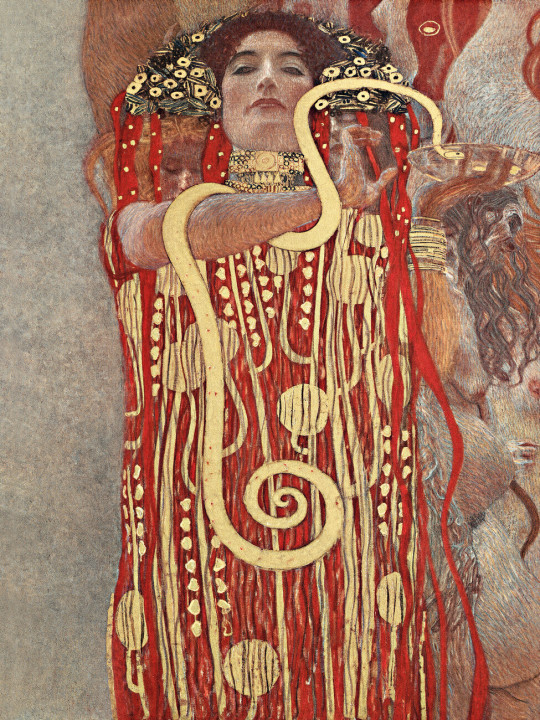
Description of the artwork «Hygieia. A fragment of the painting "Medicine" (the ceiling Paintings for Vienna University)»
In 1894, Gustav Klimt was an extremely popular artist in Vienna. His colleagues dreamt of the glory that surrounded him. He had painted many successful artworks, caressed by critics, he also managed to make the design for the Burgtheater in Vienna and the Vienna Art History Museum. He was only 26 when he received the Golden Order of Merit from Emperor Franz Josef I of Austria for his contributions to murals painted in the Burgtheater. And in 1894, Gustav Klimt received another prestigious large-scale order: the art committee of the Ministry of Education commissioned him and Franz Matsch to design the ceiling paintings for the assembly hall of the University of Vienna, and approved a budget of 60,000 Guilders (today approximately 400,000 Euros).
The painter was asked to create allegorical renderings of the faculties "Medicine," Jurisprudence* and Philosophy* along with the pendentive paintings.
Allegorical ceiling painting of Law for the Jurisprudence* faculty of Vienna University that was unfortunately destroyed in 1945:
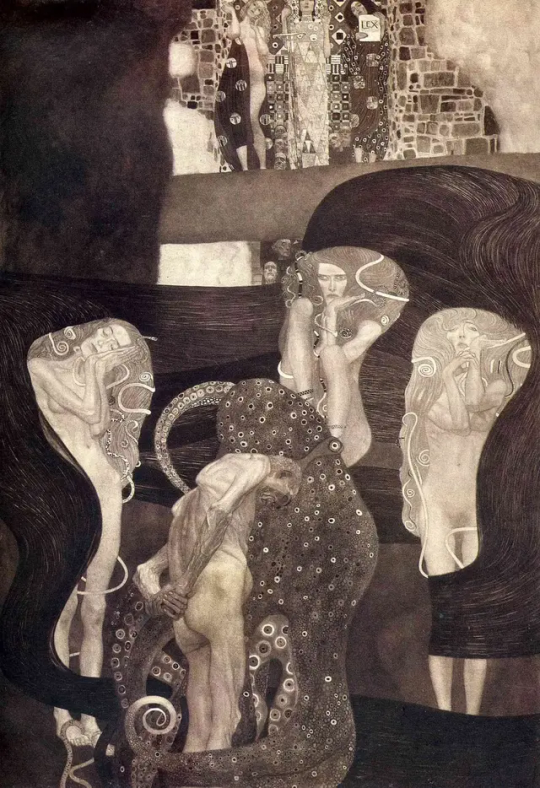
Allegorical ceiling painting for the Philosophy* faculty of Vienna University that was unfortunately destroyed in 1945:
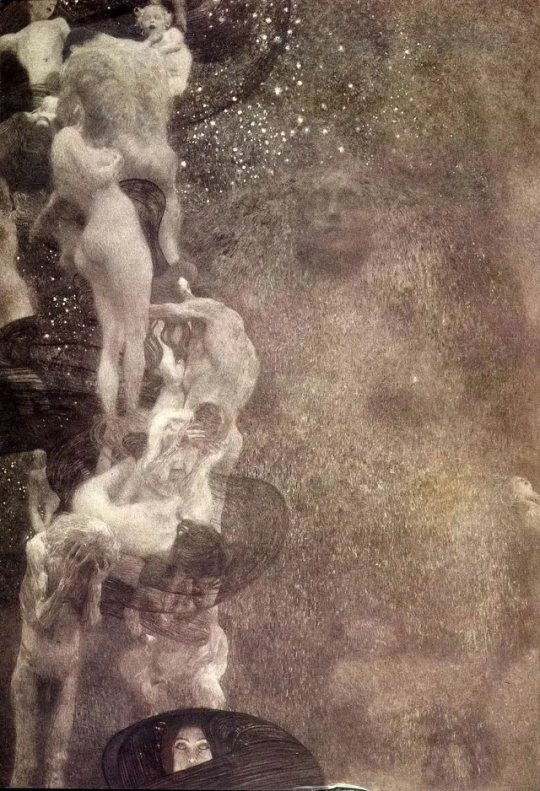
He first presented his rendering Philosophy* at the 6th Secession exhibition in 1900, followed by Medicine* at the 10th Secession exhibition in 1901. Both works met fierce criticism and sparked outrage over artist’s departure from the hitherto adhered to historic-conservative painting traditions. Klimt was asked several times to rework his motifs and even rented a second studio with higher walls in Vienna to accommodate the large-scale works. His Faculty Paintings became a political issue. In 1905, the artist refused to deliver the artworks to the Ministry of Education and, aided by his patron August Lederer, paid back his fee of 30,000 Crowns (today approximately 162,000 Euros). It was to be Gustav Klimt’s last public commission.
At first sight, Klimt's "Hygieia" seems to be put another representation of the femme fatale. "Hygieia" confronts the viewer almost scornfully, her haughtiness is implied by her upraised chin and inscrutable gaze and her posture is slightly ominous, the golden snake twines sinuously along her upraised arm and it is unclear whether she offering the bowl or withholding it. The stylization of her encompassing red and gold robe serves to hide her body and her hair is covered beneath her rich headdress, the only indication of humanity and feminine sensuality lie in her bare face and arms, and even here, her sensuality becomes a source of power, though she stares out of the painting, her eyes are hidden in shadow. It is clear that "Hygieia" is powerful and dangerous in her own right.
"Hygieia", according to Greek myth, was the goddess of hygiene, of health, cleanliness and sanitation. In fact, the snake and the bowl remain symbols of pharmacy to this day. In this context, she was not a femme fatale but belonged rather in the traditional categorization of women as caretakers. This explanation of "Hygieia" contrasts with Gustav Klimt's powerful, inscrutable and even ominous depiction of her.
At the same time, it is clear that "Hygieia" is not the only figure in this artwork, hidden amongst her elaborate headdress are the reposing faces of two women and the bare torso of a naked pregnant woman is partially hidden by "Hygieia's" red robe. Behind "Hygieia", or perhaps within her, are very human very vulnerable women whose downward gazes, flowing hair and nudity speak much more to traditional depictions of women than "Hygieia's" strange defiance and power. Is she protecting these women? Is she instead threatening such women? Are these women another side of "Hygieia," is she both vulnerable and powerful, innocent and mysterious? These questions are swallowed in the inscrutable gaze of Klimt's "Hygieia."
#gustav klimt#hygieia#medicine#philosophy#law#jurisprudence#allegorical art#allegorical painting#hygiene#vienna university#1940s#21st century art#greek mythology#femme fatale#femme fatales#dark feminine aesthetic#dark feminine energy#serpents#snakes#serpent#snake#1940#women in art#austrian artist#austrian artists#austrian art
6 notes
·
View notes
Text
Smrtolf (Canon) "Stubborn"
For the lovely @adridoesstuff :) Eduard attempts to retrieve Rudolf from Mayerling.
“Imperial Highness.”
“Mmmm?” Crown Prince Rudolf seemed to be completely ignoring Eduard for the missive in his hand, and Eduard took a brief glance around the room. There were a half a dozen crows perched all around the room plus the raven on Rudolf’s shoulder and a suspiciously moving shirt on the ground. Far from a hunting lodge, the Crown Prince seemed to have turned his house at Mayerling into an aviary. “What now, Minister-President?” The Crown Prince finally looked up, utterly disinterested.
“The Emperor is becoming displeased.” An understatement if ever there was one. Were Rudolf his son Eduard might smack the boy. As it was, Franz-Josef had dispatched Eduard to recall the prince to the capital. By whatever means he saw fit.
Eduard had mused on the Emperor’s words during the carriage ride. Franz’s words had been vaguer than he would have preferred. ‘Any means he saw fit.’ But somehow if Eduard brought the Prince back trussed and bound he thought the Emperor might not be best pleased. And the brat knew it.
“He’s always displeased with me, Minister-President. How have you displeased him such that you were demoted to messenger boy?” The Prince looks entirely too pleased with himself for his words. Eduard finds it a bit childish. “And I’ve been reading the small mountains of paperwork he sends daily. Shouldn’t he be pleased I’m not- how was it he put it last time? - acting a tool of the French?”
The prince’s recollection of the Emperor’s words is not quite correct, but for perhaps the first time Eduard almost finds himself agreeing with the boy. The Crown Prince’s recent absence from Court hasn’t been unwelcome - if anything it makes Eduard’s life easier to not have to manage a rebellious princeling in addition to the ministers.
“Nonetheless, he wishes you to return, Imperial Highness.” In a show of solidarity against any muttered nationalistic opposition, if anything else. Eduard understood why, but in this he didn’t agree with the Emperor. Sometimes it was better to have the illusion of a minor disagreement than the potential for the confirmation of a major one. The Crown Prince had been less and less inclined to follow orders in recent months and years.
“I imagine he does.” The Crown Prince takes a sip of his drink. He hadn’t offered Eduard anything or ordered servants to do so. “But I find I have no desire to return to Vienna today.”
The boy is infuriatingly calm in his disdain. He knows there is ultimately nothing Eduard can do. Despite the Emperor’s orders, despite everything. Eduard doesn’t have any way to come back to the capital. Convincing him was the Emperor’s intent, despite his words.
“Imperial Highness-” Eduard is interrupted by a squawk coming from the moving shirt. A small black and white crow emerges from the shirt and gives a chirp before looking Eduard up and down and giving another noise.
“I’m not going, Count Taaffe.” A few chirps emulate from around the room as if in agreement. The black and white crow hops up on a table a little too close to Eduard’s hand. Rudolf for his part offers a hand to the raven on his shoulder and cradles the bird close, giving it a few scratches.
“Imperial Highness, you are testing the Emperor’s patience.” Technically true. Though Eduard is admittedly trying to imply that the Emperor is substantially closer to having his son trussed and dragged back to Vienna than he is. The Emperor is annoyed at most.
“I imagine I am, Count. Did you not vex your father when you were my age?” Rudolf is being purposely difficult. As if this was even remotely similar to the normal childish antics of young men. Rudolf was a prince, even if he chose to act like a young bohemian artist most of the time.
The birds all chirp in agreement with the Crown Prince, and Rudolf raises an eyebrow. Eduard knows well that his cause is likely lost and he will return to the capital with nothing to show for his efforts and an entire day that could have been spent on far more useful tasks wasted.
“Is there anything else, Count?” Rudolf’s words are almost amused, and a prelude to a dismissal. The little black and white crow had taken a few steps closer and was now inspecting Eduard’s hand without even the slightest shred of fear.
And somewhat impulsively, Eduard reaches a hand out to stroke the bird’s head. The feathers there are ruffled, but at Eduard’s touch they start to lie flat.
“Count, I-” Eduard notices Rudolf’s voice, but for once he is ignoring the princeling. The bird's feathers have an interesting texture, quite soft but also silky.
The pain is sudden and Eduard takes an immediate step back, holding his hand and looking incredulously at the bird, eyeing its beak with a new respect.
“Really wouldn’t do that.” The Crown Prince finishes, more than a touch of amusement in his voice. The bird gives a little chirp and looks back at the crown prince, almost like a small child looking for approval from an older brother before fluttering over to land on the Crown Prince’s knee.
A myriad of words run through Eduard’s mind - did he really expect the Emperor would approve of him keeping birds that were half-demon? But in the end he says nothing as the Crown Prince offers the little crow and the raven on his wrist small morsels. Had the prince trained his birds to bite?
“Farewell, Count. I hope you have a smooth ride back to the capital.”
Eduard gives a cold bow. “Imperial Highness.” The title is more meant as an insult than anything else, but the prince merely looks amused and gives the crow another scratch.
“Well done, Edwin.” It takes all of Eduard’s discipline not to turn at the words he hears behind him. The princeling is only trying to goad him now. And he has a day’s worth of paperwork to catch up on. The brat isn’t worth anymore of his time.
#smrtolf#todolf#my fic#edwin the attack crow#Rudolf encouraging bad behavior#Aemilia thinks all of this is hilareous
2 notes
·
View notes
Text
Fragments of fright (9)
From Richard Cavendish’s The Great Book of the Supernatural
THE MESSENGERS OF THE AFTERLIFE
Most people do not know when they will die - but a few of them are apparently warned of their imminent demise, thanks to the appearance of a ghost. This messenger of the afterlife can be a wraith, or a mysterious animal, and many families are proud of "owning" one.
The Hohenzollern dynasty, which reigned successively over the Brandeburg, Prussia and Germany (until the abdication of the kaiser Wilhelm II at the end of WWI) was boasting the existence of a "family ghost". This specter tied to their bloodline was a White Lady - a female ghost dressed in white, with a mourning armband, usually seen before the death of a member of the family, and appearing in the royal residences of Berlin or other Germany regions. It was believed that she might be the ghost of a princess of the 15th century, who was cruelly abused by her husband, who was a Hohenzollern. The dynasty of the Hesse of Darmstadt (Germany) also had its death herald - a Black Lady this time, in a mourning outfit, her face hidden by a dark veil. This ghost was supposed to be the archduchess Maria-Anna, wife of the archduke Ferdinand.
In the Danish royal family meanwhile, disasters were believed to be announced by the apparition at Gurre, south of Helsingor (a location that inspired the setting of Shakespeare's Hamlet), of the ghost of king Valdemar IV, who ruled on the Denmark in th 14th century and died at Gure in 1375. Another strange fact of the history of the Danish crown concerns the queen Astrid, killed in 1935 by a car accident. Some times after her death, she supposedly appeared before numerous people during a spiritism séance organized at Copenhague by the medium Einar Nielsen. A picture of her "manifestation" was apparently taken - but unfortunately, these kind of pictures are very easy to falsify and thus do not make an actual, solid proof of the ghost's apparition.
The Hasburgs, who ruled over the Austro-Hungarian Empire, were traditionally warned of any upcoming tragedy by the appearance of a group of great white birds circling in the sky. They were seen in 1889, soon before the double suicide of the heir-prince Rudolf and his mistress in Mayerling. Later, the emperor Franz-Josef the First also saw them in 1898, on the eve of the murder of his beloved Elisabeth. Finally, these sinister birds were spotted in 1914, before the Sarajevo attack which killed the archduke Franz-Ferdinand and caused World War I.
The most famous of these "messengers of death" is without a doubt the Irish banshee, which makes the pride and glory of the greatest and oldest families of the island. The banshees howls and wails with a melancholic voice through the night, crying the death of a family's member soon before it actually happens. She can appear as a beautiful maiden with a red shirt, or a green dress under a gray cloak ; or she can appear as an old hag. This "dual face", the beautiful maiden and the ugly hag, were the usual manifestations and appearances of the great goddesses of the pre-Christian Celtic religion, of which the banshee seems to be a remnant. It seems that getting rid of a banshee is hard, since there are records of them still wailing near the old domains of families that left Ireland a long time ago. A few years before the publication of this book, an American that was visiting the Aran island in the Galway bay, organized a party, with lot of music and dancing. As the night was ending, the young man returned home, playing accordion. The noise he made distressed the neighborhood, and someone had to go explain to a poor frightened old man that what he heard wasn't the screams of a banshee, but the sounds of a drunk playing very badly the accordion. Reassured, the old man knew three more weeks of peace... Until he heard the ACTUAL wails of the banshee, and soon after died.
According to a very old tradition, the death of the bishops of Salisbury is announced by the arrival of mysterious white birds flyig over the plain. Other bad omens - not necessarily meaning "death" - are the black dogs, or rather the black hounds, usually of an enormous size, that supposedly haunt the British countryside. Peel's castle, on the isle of Man, is the lair of one of those monsters, the Moddy Dhu, whose mere sight causes a person's death. You will also be doomed to die if you meet the Shriker dog, which hides in the Burnley cemetery (Lancashire). Many more sinisters black hounds are believe to wander on the paths leading to cemeteries. In a lot of popular beliefs and local folklore, dogs are associated with death, probably because in the distant past hungry dogs used to dig up corpses to eat them. There could also be something related to the strong belief that dogs are able to sense entities invisible to humans. Ghosts of dogs are particularly dreaded in the East-Anglia, where strikes the formidable Black Shuck, whose only eye shines in the darkness.
During World War II, an American air-pilot and his wife lived in Walberswick, in the Suffolk, and they had there a terrifying experience. During one whole night, an enormous black dog tried to enter in their house, and they only prevented it from doing so by piling up furniture in front of the door, that the animal nearly split open. At dawn, the beast left, but without leaving any prints in the mud surrounding the house. This event happened during a storm night - which reminds one of the old beliefs claiming that storms are caused by the mad run in the countryside of a pack of infernal hounds, whose howls causes death, madness and misfortune. In some regions, these hounds are led by the "Wild Hunter". In Denmark, it is king Valdemar that leads the pack, in Normandy the Devil himself ; in northern England it is "Gabriel's hounds" led by the Angel of Death, while in the Dartmoor the dogs follow sir Francis Drake riding a hearse. All these legends inspired without a doubt Conan Doyle when he wrote one of Sherlock Holmes' most famous adventures - The Hound of the Baskervilles.
#fragments of fright#supernatural#irish folklore#banshee#black hound#british folklore#white ladies#ghosts#danish legends#german legends
4 notes
·
View notes
Text
current reading: Sisi
Currently diving into the biography of the Empress Elisabeth of Austria - Sisi.
📖 The Reluctant Empress - a biography of Empress Elisabeth of Austria
by Brigitte Hamann
(https://www.goodreads.com/book/show/1482274.Elisabeth)
I'm reading it in German so I can at the same time improve in that language.
I decided to read this biography after I finished watching Netflix's The Empress. I mean, we all know about Sisi, and her famous love story with the Emperor Franz Josef, and tbh I've never looked beyond what have been showed through the movies with Romy Schneider. I watched these movies when I was twelve or something and all I could remember was the portrait of a gracious and beautiful Empress.
This is me getting seriously curious about her life and her feelings, and discovering about the woman behind the Empress.

#empress sisi#elisabeth of austria#current read#currently reading#book#book of the month#german literature
11 notes
·
View notes
Text
Emperor Franz Josef immortalised in song he sings himself starter pack
youtube
youtube
youtube
expect an update whenever I get around to watching the Rudolf musical
2 notes
·
View notes
Text
maximilian of mexico doodles :D
so probably almost none of you know who tf this guy is (and its fair! bc he's not part of the napoleonic wars), but as a mexican person I do! Brief context, he was Emperor of México! (1864-1867). Ferdinand Maximilian Josef Maria von Habsburg-Lothringen, younger brother of Emperor Franz Joseph I of Austria was placed as Emperor of the Second Mexican Empire by Napoleon III in the French Intervention in México, and despite the fact that it happened because Napoleon III tricked him into coming here (he falsified voting records that "proved" that the Mexican people wanted him as emperor, when in reality, México had been in civil war for some years and still were, so it was all a chaos), the love that Maximilian felt for "his new homeland", as he called México in his last words, was true.
today is his bday! made lots of doodles of him.
i would talk a lot more ab his bubbly and sweet (but naive) personality and why i draw him as a fucking big bear but i actually don't think anyone would be that interested, and it's okay! I hope to be posting napoleonic-wars related stuff soon

first, a reference of him, ofc
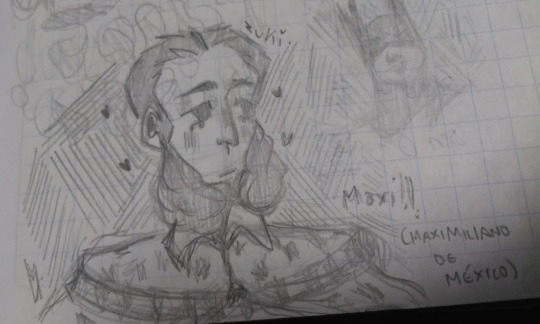
maximilian!... and batman?
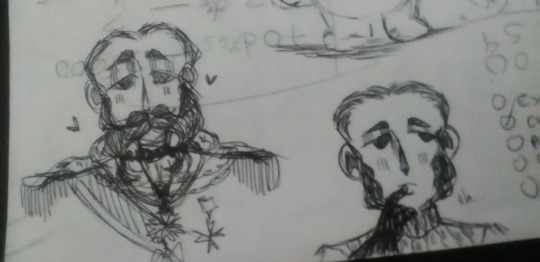
older and younger maximilian


And that's it! Thank you for reading!

18 notes
·
View notes
Note
With the few adaptations of Sissi and her marriage to Franz they always show a scene where he has to sign off death penalties and seems hesitant to do so. Is this something that is accurate? Or do they add it to make him seem more likeable?
Hello anon! This is an interesting question because I feel that this is something that's never really properly explored - not only in fiction, but also on non-fiction. Let’s start with how fiction handles this:
The latest two series about Empress Elisabeth both introduce the young emperor in a scene in which he orders the execution of rebels - although they handle it quite differently, almost oppossite. In Sisi (2021-), an annoyed Franz Josef smugly complains about how these rebels brought over themselves their deaths “only for a constitution”, and only seems troubled by it when a woman in the crowd curses him (can’t remember if this happens before or after he orders the men to be hanged). In Die Kaiserin (2022-), a very hesitant Franz Josef cannot even bring himself to order the execution and in the end is his mother who orders the rebel men to be hanged (a great example of this series’ writing superb subtlely *sarcasm*). Now these are clearly scenes which have the function of introducing the characters and setting their inner conflicts: Jannik Schümann’s FJ being an arrogant man who almost seems to enjoy his impunity, suddenly being faced with the real consequences of his actions, while Philip Froissant’s FJ is a weak-willed ruler controlled by his mother that most break free from her in order to follow his liberal ideas (yeah he’s Rudolf here). So which of these two portrayals is closer to reality?
Well, probably neither. Because first of all, Franz Josef was not present at the executions (or at least I’ve never came across with any account that places him there), so neither of these situations would have happened. And second, neither fully allign with what we know of him as a young emperor. For Franz Josef the executions and repression were a matter of putting his empire in order, he believed in the dynastic right of the Habsburgs and that it was his duty to rule over his subjects, that's it. Neither of his portrayals are accurate to him, because they're both emotional takes: in one he's a cruel man that must find mercy, in the other he's a merciful man but weak ruler that must find strenght (and in both cases, he must find this through loving his wife). In reality, he was a bureaucrat signing off orders that thought would bring back the power to the dynasty, that was always his only main goal. That's also why years later he was willing to compromise with the Hungarians. Emotions just never played a part in his policies, which is what the series miss in their respective characterizations.
Now on the historical accuracy:
The two people held to be the main responsible of convincing the emperor of following a policy of repression are his mother Archduchess Sophie and the Prime Minister of Austria Prince Felix Schwarzenberg. Sophie indeed thought that the revolution must be crushed, meanwhile Schwarzenberg allegedly said that “Mercy is a good thing, but we must do a little hanging first”. How much did they actually influenced him, however, is all up to speculation. He was very young (only eighteen!!) and deeply respected his mother's opinions, as well as he agreed with Schwarzenberg, but he also wasn't a manipulable person and one of his first goals was to rule alone as an autocrat.
The emperor appointed General Julius Haynau to lead the forces against the revolutionary Hungarians in 1849. Haynau already had earned a reputation as a violent man for the brutal repression he commanded against the Italians during 1848, and was said to have “a meanness not entirely in keeping with military dignity”. About the exact number of people that lost their lives in Hungary during the revolution and the counter revolution, Hungarian historian András Gerő says in his biography of Franz Josef that:
We do not possess detailed information concerning the ensuing terror. We can barely say with certainty how many lost their lives fighting for the rights of their nation in 1848-49. Generally speaking, only the victors draw up statistics. According to Austrian calculations, some fifty-five thousand Hungarians fell in the fighting. The period of repression, which lasted through the autumn and winter of 1849, saw 120 judicial executions: the number of those executed without due process, “shot while escaping,” as the grim saying goes, remains unknown. Around forty to fifty thousand were forcibly recruited into the army or deported, while 1,200 were imprisoned. Thousands emigrated. The lack of adequate statistics speaks for itself. Similarly expressive was the manner in which the resolution of 20 August was enforced. Haynau had wanted to stage large-scale executions as early as 24 August, but the Russians and the Habsburg court had restrained him.
These executions were all highly unpopular abroad and there was an outcry of indignation from many other countries. Needless to say, this also made the young emperor a hated figure within the empire too. By 26 October of 1849 Franz Josef called the executions to a halt, in part because of the protests against them but also because most of the big figureheads of the revolution who were caught had already been punished. However:
Haynau remained unconcerned: he continued to issue and to carry out death sentences against the emperor’s orders. Despite the embarrassment this caused, for the time being the emperor did not react to Haynau’s brazen insubordination. It seems that he did not lack “‘patience,” “human understanding,” and the “spirit of forgiveness” after all (what is more, Francis Joseph even decided to pardon some, albeit low-ranking, offenders).
I've seen people dismissing the emperor's role in the counter revolution by pinning it to others (which is what Die Kaiserin did by stating that Sophie singlehandedly was the responsible for the rebels executions). Which I don't agree with. I mean, if the EMPEROR isn't responsible for the policies applied in his name with his consent, then who is? To quote Gerő once again:
In hindsight, while Francis Joseph’s responsibility can be shared out among others, it cannot in any way be diminished. Naturally, both Schwarzenberg, the prime mover of events, and Haynau, who had acted under orders, were complicit. But Francis Joseph could have withdrawn his consent at any time. As we have seen, he had demonstrated on a number of occasions his readiness and ability to act as he saw fit when he felt the need to demonstrate his free will and sense of responsibility as a sovereign. He had every opportunity to make up his own mind about the policy of repression, if he had thought differently from his advisors. Furthermore, this would have been a wise course, given that a willingness to be merciful was part of the image of a sovereign, and that there were some who actively urged him in that direction. Had he exercised mercy, his rule over Hungary would not have been undermined. However, showing mercy was not a matter of principle for him, but rather one of tactics.
Now if he ever regretted these executions, I don't know. The only thing that I could find is this that Elisabeth said to Bishop Mihály Horváth: “Believe me, if it were in our power, my husband and I would be the first to bring Luwdig Battyany and the blood witnesses of Arad back to life” (1986, Hamann). Which is an statement that I would take with a grain of salt, to be honest. I don't doubt that Elisabeth was being sincere on the sentiment (in fact she ended up befriending Batthyány's son), but whether the sentiment truly extended to her husband is hard to say (if someone knows of any statement Franz Josef ever made of this please add it!)
Hope you found my answer helpful!
#tl;dr: fj was a really boring man and this is the series way of making remotedly interesting#also I focused on Hungary because Gerő's biography is the only one I found that goes in depth on this - others just brush over the subject#but they weren't the only ones who suffered from the repression policies after 1848#franz josef i of austria#sisi (2021)#the empress (2022)#die kaiserin (2022)#historian: andrás gerő#Emperor Francis Joseph King of the Hungarians#asks
9 notes
·
View notes
Text


"LUZIWUZI. I am the empress." From the premiere on February 15, 2024, @conchitawurst will be on the stage of the @rabenhoftheater as Archduke Ludwig Viktor - youngest brother of Emperor Franz Josef, free spirit and probably the most eccentric Habsburg. Director @ruth_brauer will design a musical-theatrical evening with @floriancarove, @gerhardkasal, @kyrrekvam, Tom Neuwirth aka @conchitawurst and @sebastian.wendelin, between extravagant glamor and heart-rending tragedy - great anticipation!
Photos: @die_ida / @rabenhoftheater
https://www.instagram.com/p/CtZY63ZKgAy/
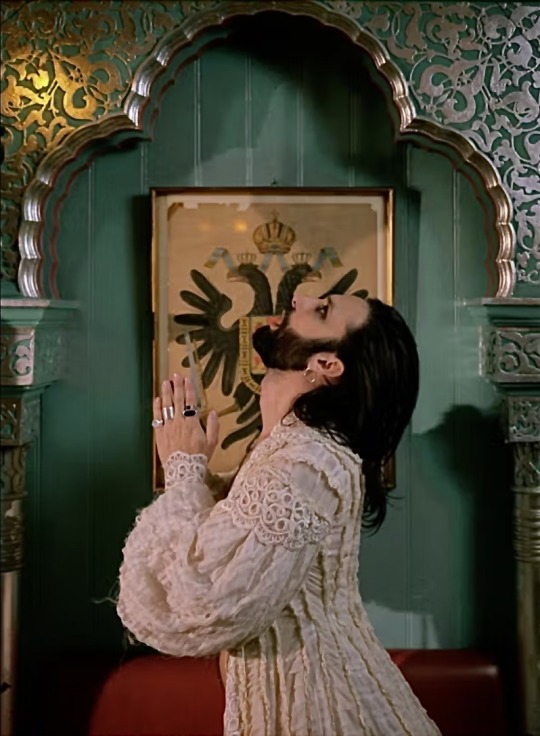
The Rabenhof celebrates its 20th anniversary and brings Conchita Wurst on stage as Archduke Ludwig "Luziwuzi".
Conchita as the highlight of the Rabenhof season
A highlight of the season is certainly the new piece "Luziwuzi", which interprets the life of the eccentric Habsburg Archduke Ludwig Viktor in a musical and theatrical way. Conchita Wurst, alias Tom Neuwirth, slips into the leading role and plays the youngest brother of Emperor Franz Josef, who is the subject of many legends. The premiere will take place on February 15th and the play will be staged by the successful director Ruth Brauer-Kvam. Florian Carove, Gerhard Kasal and Sebastian Wendelin are on stage – and also slightly overcast.
#conchitawurst#tomneuwirth#singer#artist#esc2014#escwinner#music#performer#celebrity#wurst#queer artist#theatre
0 notes
Text
I’m watching this youtube series that covers World War I at the rate of one ten minute episode per irl week and at this point I’ve become enthralled....what acts of criminal negligence are going to be committed by the world’s foremost strategists? How many thousands of guys are going to die in ways that I personally was assured as a paranoid five-year-old weren’t a thing? How is absolutely nothing going to contrive to happen anyway
#i had to google conrad von hotzendorf to find out when he gets fired and it's NINETEEN SEVENTEEN????#i'm literally angry at real dead emperor franz-josef for this! people died!
12 notes
·
View notes